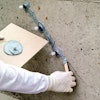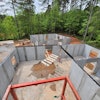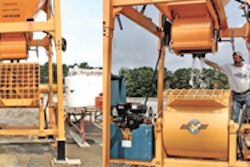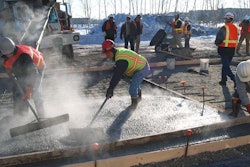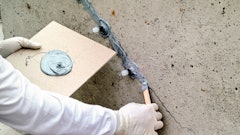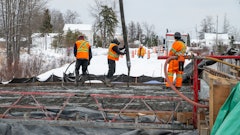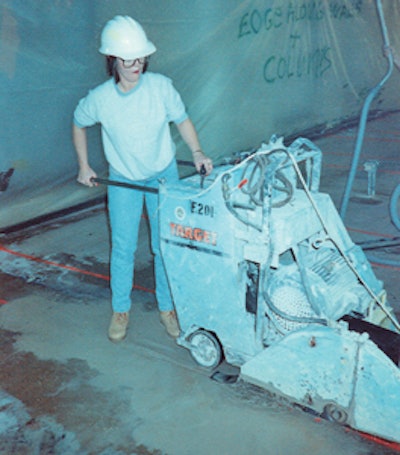
Construction is traditionally known as a male-dominated occupation and the concrete industry has not been an exception. Although more women have been employed by or become owners of concrete companies over the years, struggling to gain acceptance was common not that long ago.
Initial resistance to women
The experience of Karen Elin Johnson, president of Roughneck Concrete Drilling & Sawing Company, is typical. After working as a paralegal, she joined her father in his company in 1990. She spent several months in the office learning the systems and protocol before she started making sales calls and going to jobsites, where she learned the tools and equipment. Her paralegal background was valuable in analyzing contracts and doing collections and insurance.
"I worked on lowering our insurance costs and worked on developing a safety program and a safety incentive program, preemployment physicals, prehire drug screenings, getting some systems in place to help protect us so we would have better quality people to work," she recalls. "They were doing everything the old-fashioned way. We needed to be brought up closer to the next century."
Johnson purchased the company in June 1994. "Initially, I was told I wouldn't make it — 'Go back downtown, this is a man's world,' " she says. "I was making a sales call to an older man who had been a customer of my father's for many years. This gentleman told me, 'No offense, Karen, but I've never done business with a woman and I'm not going to start now.' I got very little work from that company. Then when he retired, a much younger person came in to take over his role and we do a fair amount of business together now."
Some industry associations have also had problems accepting women. "There was a professional organization I wanted to become a member of and they refused my membership three years in a row," Johnson says. "Ultimately they did let me in, but one board member told me there were several who didn't want a woman as a member. Finally someone said, 'She's going to sue us if we don't let her in,' so they finally did." She had sought membership to help her business, and after she joined, her membership enabled her to meet people and make valuable connections.
Although Johnson is now president of the Association of Subcontractors and Affiliates — Chicago, she says there are still several industry organizations that don't give women a warm welcome. "I think there's still a lot of old school people who aren't interested in having women work in construction," Johnson says. "They're not accustomed to it and they don't really reach out."
Susan Hollingsworth, chief executive officer of Holes Inc., had similar early experiences. With her former husband as her business partner, the company was started in 1972. While he did the field work and outside sales with the help of his father, brother and one employee, she handled inside sales, bookkeeping and everything else.
"When we were first in business and I was answering the phone, I got here at 5:30 in the morning," Hollingsworth notes. "The person who called said, 'Is this the answering service?' I said, 'No, this is the office.' He said, 'Well, is anybody there?' We went back and forth for about five minutes. When he finally realized I could get the work quoted and dispatch it, he was embarrassed." She told her partner they needed a man to answer the phone whom she could train.
Chris Klemaske, who started in concrete restoration and now works in project development at T.B. Penick & Sons, Inc., says when she started in the business 18 years ago, she sometimes had trouble convincing people she knew what they needed.
"I'm still used to being one of the only women on a jobsite," she says. "I believe that we've built up a reputation where I don't run into the same kind of 'What do you know?' attitude. I've been around long enough now that I've never felt I wasn't taken seriously. I've never worked anywhere else (geographically), so I don't know what San Diego's attitude toward women in construction is compared to other places. I've never run into the good old boys club here."
Taking advantage of gender
Since Klemaske works in decorative concrete, she feels being female is an advantage.
"I think I have one of the best jobs there is," she says. "I get to work with really creative interesting people on great projects. Whenever I start with a project, I stay involved all the way through to the end."
Clients meet with her first to select their materials and designs. She maintains that relationship by visiting jobsites and staying in touch with the project manager and superintendent to be sure the client's expectations are met.
Hollingsworth took over her company in 1992 when her business partner died. At first, she kept the management change quiet.
"Honestly, my philosophy was not to tell anybody I was running this company," she says. "My contractor companies for a long time really didn't know. When my oldest daughter came onboard, she said, 'We've got to shout this from the rooftop.' She started working with a lot of the construction associations here in Houston and took the lead in promoting us as a woman-owned business." Now her daughter, Darlene Aitken, is company president while her other daughter, Kellie Vasquez, manages human resources and marketing.
Hollingsworth is the first female president of the Concrete Sawing and Drilling Association, which is active in promoting safety and training. She said the group has always been very supportive of her.
"At every meeting I go to, I learn something from somebody that I can bring back which helps me make this company better," she says.
Roughneck is certified as a woman-owned business and that fact is included on its trucks, in its ads and in every way it markets its services.
"It has helped open doors for me for opportunities for work," Johnson notes.
A good career for women
All three women agree that the concrete industry is a good field for women and would encourage others to get involved. At the same time, like any business, getting started may not be easy.
"There's a lot of sacrifices you have to be willing to make," Johnson points out. "You have to be sure you're willing to follow through, but stick with it. You're going to find bumps in the road and fall down, so you have to pick yourself up and keep going. I think it pays off over time. In general, it has gotten harder to be a business owner, especially a small business owner, because you have to be more sophisticated today. There are so many things that have changed. You really have to be on top of your game and stay ahead of the changing times or you're going to be passed by."
However, she believes by giving customers good, reliable service as her company does, success is achievable.
Klemaske says women who are thinking about the field should get in on the ground floor at a concrete construction company and learn everything they can about how concrete is made and installed. They should look at the different types of jobs available, many of which, like project managers and estimators, come with good salaries and don't involve placing concrete.
"It's a great occupation," she says. "It's really something that's challenging and enjoyable. It's not age restricted. It's something that you can grow old and continue to do."
However, because each field person works alone, Holes Incorporated has not been successful in hiring women for these hands-on positions and points out the facility problems at jobsites like the lack of bathrooms.
"Construction will have to be more adaptive to attract more women," she notes. "The other problem with construction is you don't have a predictable day or shift. And that's very hard on women, especially if they have children."
Hollingsworth is concerned that the current shortage of tradespeople will become worse because so many workers are nearing retirement and too few new workers are replacing them. She'd like to see more emphasis on encouraging students to attend craft and trade schools.
"I think the focus in education is that everyone should go to college and that's not for everybody," she says. "There are many smart and talented people who would prefer a challenging job and could use their skills in trades and it's not always advertised."
Jean Feingold is a Gainesville, Fla.-based writer who frequently covers concrete and other construction-related topics.

